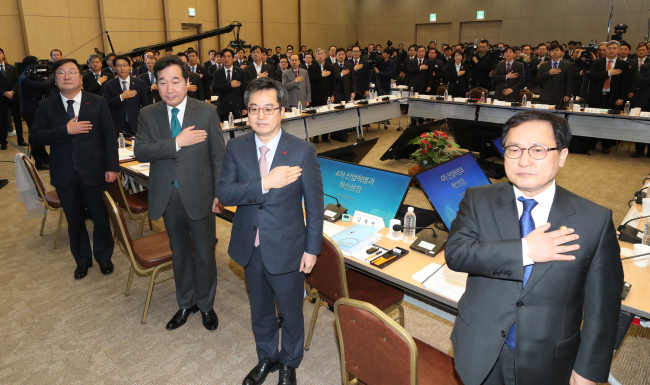Seoul vows to cut mobile bills, unveils investment plans for science, blockchain
ICT Ministry sets aside W1.42tr for basic science, W10b for AI, W4.2b for blockchain
By Song Su-hyunPublished : Jan. 24, 2018 - 16:19
The Ministry of Science and ICT announced cutting mobile bills by an average of 18 percent and abolishing the uniformly used digital signature certificates system as major policy goals for this year at a government policy briefing session in Sejong on Wednesday.
As the control tower for scientific research and development projects, the ministry said it will inject a total of 1.42 trillion won ($1.33 billion) for R&D of basic science this year, 10 billion won for artificial intelligence and 4.2 billion won for the blockchain industry.
The ministry said its goals are focused on the quality of life of the people in the era of the “fourth industrial revolution,” the economic mantra of the Moon Jae-in administration.
“Despite possible hurdles to legislating the new bill plan at the National Assembly, the ministry is firmly determined to reach the goal of cutting the data price,” said Yang Hwang-jeong, director general of telecommunications policies at the ministry.
As part of policy measures to help reduce households’ mobile costs, the ministry will urge telecom firms to lower prices of mobile data bills to 4.29 won per megabyte, from 5.23 won per MB last year.
As the control tower for scientific research and development projects, the ministry said it will inject a total of 1.42 trillion won ($1.33 billion) for R&D of basic science this year, 10 billion won for artificial intelligence and 4.2 billion won for the blockchain industry.
The ministry said its goals are focused on the quality of life of the people in the era of the “fourth industrial revolution,” the economic mantra of the Moon Jae-in administration.
“Despite possible hurdles to legislating the new bill plan at the National Assembly, the ministry is firmly determined to reach the goal of cutting the data price,” said Yang Hwang-jeong, director general of telecommunications policies at the ministry.
As part of policy measures to help reduce households’ mobile costs, the ministry will urge telecom firms to lower prices of mobile data bills to 4.29 won per megabyte, from 5.23 won per MB last year.

The ministry ultimately plans to introduce a universal plan for mobile bills that will offer more than 200 minutes of voice calls and over 1 gigabyte of data for about 20,000 won per month for all mobile phone users.
The universal plan was first discussed as one of the means to ease the burden on households stemming from high mobile costs, along with a cheaper plan for senior citizens and an optional 25 percent discount for ordinary users, which were implemented last year.
The ministry aims to have relevant bills legislated by the first half of the year and to put them in place in the second half.
Meanwhile, 10 billion won has been set aside for the development of core technologies for artificial intelligence and 4.2 billion won for pilot businesses using blockchain technologies.
To create a better quality of life, the ministry will spend 449 billion won, up 18 percent from last year, to improve public facilities that directly affect people’s health and lives, including apparatuses to tackle the fine dust problem.
The ICT Ministry has set the end of the year as the timeline to abolish the country’s infamous public authentication certification system for electronic ID verification of e-commerce users, while planning to suggest new technologies such as blockchain and biometrics as alternatives.
The public authentication certificate, stored as a soft file in individuals’ PCs, has been the target of hackers, while inconveniences have been causing complaints among users, as the system requires the installation of the Active X software framework only available through Microsoft’s Internet Explorer. The government decided to abolish the system during a presidential meeting held Monday.
The government is also pushing to abolish the EXE software system that is used as a replacement for Active X by next year.
According to the ministry’s plan, the government will revise the Electronic Signatures Act this year in a bid to nullify the current superior status given to electronic certificates and approve other authentication means.
By Song Su-hyun (song@heraldcorp.com)







![[Graphic News] More Koreans say they plan long-distance trips this year](http://res.heraldm.com/phpwas/restmb_idxmake.php?idx=644&simg=/content/image/2024/04/17/20240417050828_0.gif&u=)
![[KH Explains] Hyundai's full hybrid edge to pay off amid slow transition to pure EVs](http://res.heraldm.com/phpwas/restmb_idxmake.php?idx=644&simg=/content/image/2024/04/18/20240418050645_0.jpg&u=20240419100350)





![[From the Scene] Monks, Buddhists hail return of remains of Buddhas](http://res.heraldm.com/phpwas/restmb_idxmake.php?idx=652&simg=/content/image/2024/04/19/20240419050617_0.jpg&u=20240419175937)

![[KH Explains] Hyundai's full hybrid edge to pay off amid slow transition to pure EVs](http://res.heraldm.com/phpwas/restmb_idxmake.php?idx=652&simg=/content/image/2024/04/18/20240418050645_0.jpg&u=20240419100350)

![[Today’s K-pop] Illit drops debut single remix](http://res.heraldm.com/phpwas/restmb_idxmake.php?idx=642&simg=/content/image/2024/04/19/20240419050612_0.jpg&u=)